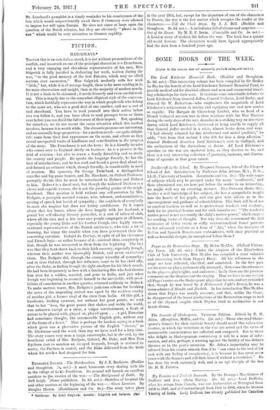FICTION.
HATCHWAYS.* Tnonon this is an ante-belle us novel, it is not without premonitions of the conflict, and inasmuch as one of the principal characters is a Frenchman,
and a very engaging and chivalrous representative of his race, Miss Sidgwick is fully justified in dedicating her work, written during the war, " to the -good memory of the first Entente, which may no allied sorrows ever unsweeten." Miss Sidgwick modestly calls her work " little," but, while it is of average length, there is far more reading in it, far more observation and insight, than in the majority of modem novels. It is not a book to be skimmed ; it needs leisurely and even careful read- ing. This is largely duo to the somewhat elliptical style of the conversa- tion, which faithfully represents the way in which people talk who belong to the same set, who see a good deal of one another, and use a sort of oral shorthand. You have to read yourself into their milieu before you can follow it, and you have often to read passages twice or thrice over before you can distil the full essence of their import. But, speaking for ourselves, we do not resent the extra attention which this method involves, because it is worth while. The dramatis personae are interesting, and an unusually large proportion—for a modem novel—arc quite delight- ful: some from their first appearance on the scene, and others as they reveal unexpected traits of kindliness and consideration in the progress of the story. The Frenchman is not the hero ; he is a friendly invader who comes over to England chiefly on business—he is a pioneer in tire field of aviation— but also to renew a family friendship and to study the country and people. He speaks the language fluently, he has the best of introductions, and he has read and heard a great deal about us, and formed an estimate which, though friendly, is considerably in need of revision. His sponsors, Sir George Trenchard, a distinguished traveller and big-game hunter, and Mr. Merchant, an Oxford Professor, promptly decide that he must be introduced to Helmer and Holmes to him. Holmcr is a ducal seat, but though the widowed Duchess is a clever and capable woman, she is not the presiding genius of the neigh- bourhood. That position is held without any self-assertion by Mrs. Redgatc, a youngish married woman, wise, tolerant, undemonstrative, sparing of speech but lavish of sympathy ; the confidante of everybody because she inspires but does not betray confidences. So it comes about that her house, where she lives happily with her husband, a genial but self-effacing literary journalist, is a sort of informal club, where all the nice and a few semi-nice people congregate at all hours, especially the young Duke and his brother Iveagh, two highly uncon- ventional representatives of the British aristocracy, who take a lot of knowing, but repay the trouble when you have penetrated their dis- concerting exteriors. Gabriel du Frettay, in spite of all his cleverness and French logic—or rather because of it—misread them completely at first, though he was interested in them from the beginning. 7 he fact was that they both threw back to their Irish ancestry, especially Iveagh, whereas their mother was thoroughly British, and never understood them. Mrs. Redgate did, through the strange wizardry of sympathy; and in time Gabriel, through her influence, came to be her chief ally, after the Duke, in finding Iveagh the right anodyne for his black moods. He had been desperately in love with a fascinating flirt who had thrown him over for a soldier, married, and gone to India, and just when Iveagh was beginning to reconcile himself to the inevitable, with possi- bilities of consolation in another quarter, returned suddenly to Helmer. To make matters worse, Mrs. Redgate's judicious scheme for breaking the news of the impending arrival was upset by the reckless cruelty of another girl, a former rival of the siren from India. Of this girl, a handsome, dashing creature, not without her good points, we read that to her " love, the great power that shakes and welds the world, was unknown except as a show, a vulgar entertainment, a freak of nature to be played with, played at, played upon . . . a girl, Ernestine had sometimes thought, like innumerable English girls, without any of the forms of a heart." That is perhaps the hardest saying in a book which gives one a pleasanter picture of the English "classes," as Mr. Gladstone used the word, than any we have read for a berg time. The story comes very near a tragic catastrophe, but in the end, by the beneficent cabal of Mrs. Redgate, Gabriel, the Duke, and Miss Bess Ryeborn (not to mention an escaped leopard), Iveagh is restored to sanity, the Duchess is routed, and the Duke delivered from the bride whom his mother had designed for him.






































 Previous page
Previous page